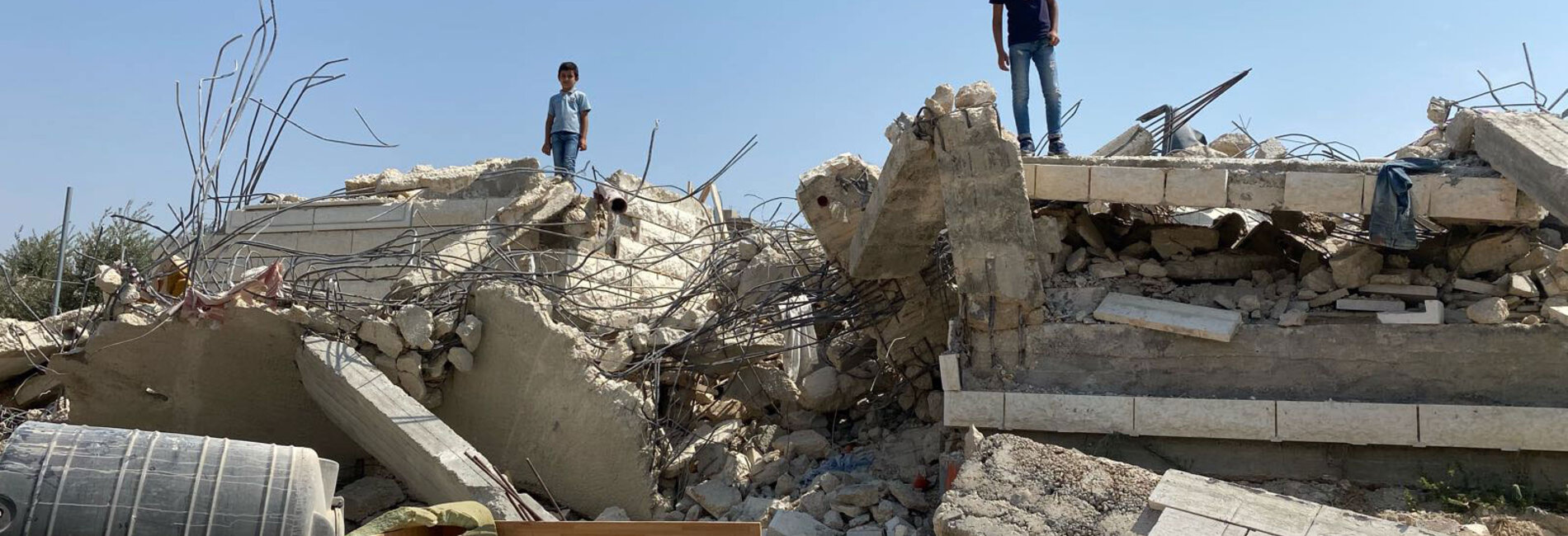Peak in demolitions and confiscations amidst increasing denial of the right to justice
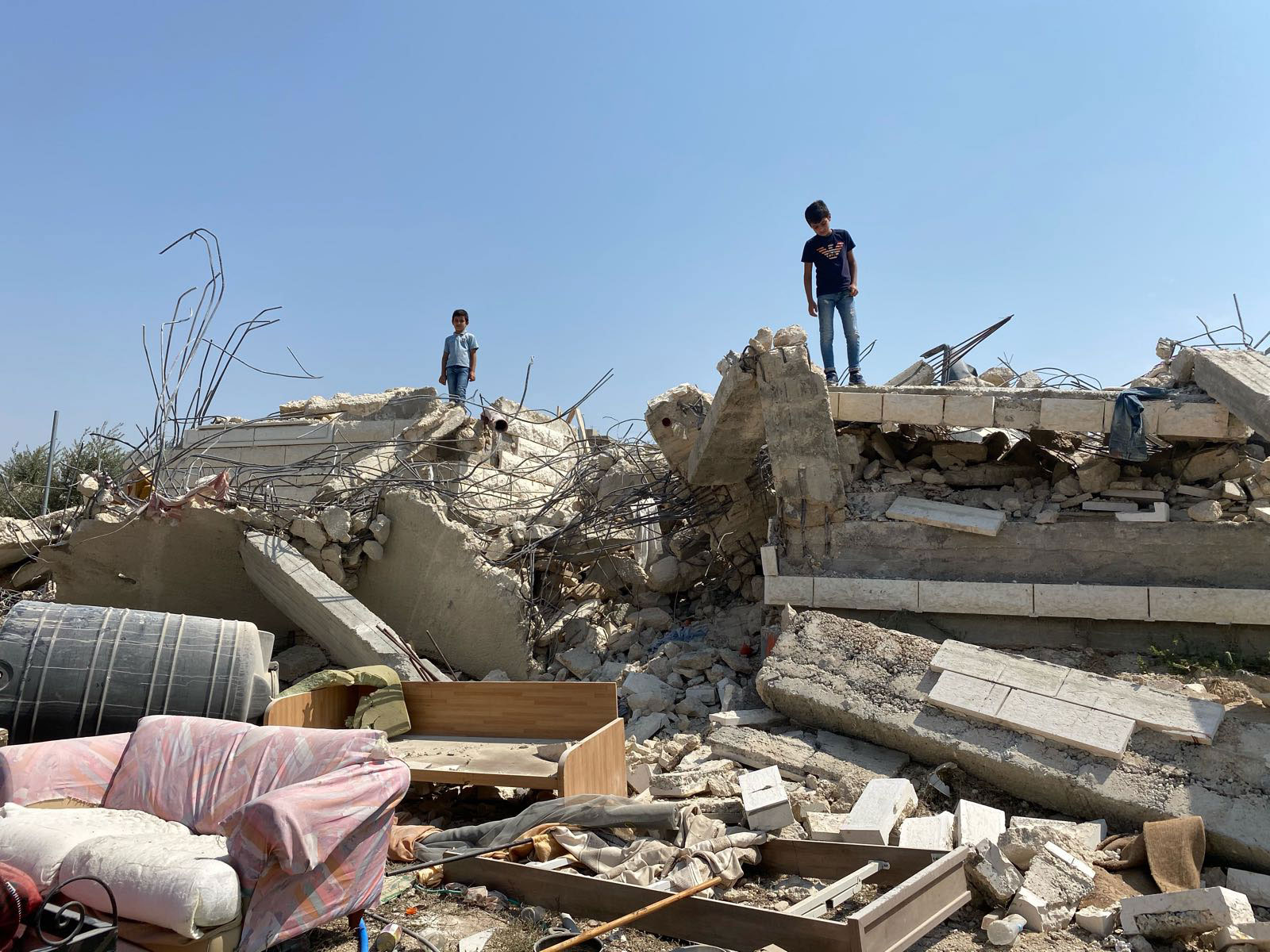

The Israeli authorities’ demolitions and seizures/confiscations of Palestinian-owned properties across the West Bank was on the rise in 2020: the cumulative number of structures targeted (848), exceeded the figures recorded in any complete year since OCHA began systematically documenting this practice in 2009, with the exception of 2016. As a result, 996 Palestinians, including 518 children, were displaced in 2020. All but seven of the 2020 demolitions/seizures were in Area C or in East Jerusalem, and were carried out on the grounds of a lack of Israeli-issued building permits.[1]
Such permits, however, are nearly impossible for Palestinians to obtain. Palestinians are allowed to build in less than one per cent of Area C and in only about 15 per cent of East Jerusalem, which have planning schemes approved by the Israeli authorities.[2] Between 2015 and 2019, fewer than four per cent of Palestinian applications for building permits in Area C were approved, according to information provided by the Israeli Civil Administration (ICA).[3]
Palestinian structures demolished/seized (West Bank)
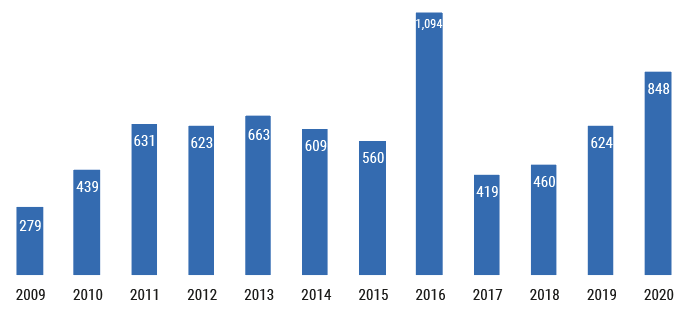
The acceleration in demolitions and seizures in 2020 took place amidst the increasing use of legislation that limits the ability of affected families and communities to challenge the targeting of their homes and sources of livelihood in Israeli courts. In Area C, new military orders have enabled the Israeli authorities to circumvent the procedures enshrined in the planning legislation and execute the demolitions/seizures without, or with very short, prior notice. In East Jerusalem, the new legislation narrowed the courts’ discretion to postpone demolitions and enabled the municipality to exert harder pressure on Palestinians to self-demolish their homes built without permits.
The humanitarian impact of home demolitions has been exacerbated by the challenges they pose on those trying to adhere to COVID-19 safely guidelines and for infected persons who need to isolate.[4]
The destruction of property in an occupied territory is prohibited under the Fourth Geneva Convention, except where such destruction is rendered absolutely necessary by military operations.[5] The destruction or confiscation of property commonly also results in the infringement of a range of human rights, including the right to an adequate standard of living.[6] Finally, under international human rights law, “everyone shall be entitled to a fair and public hearing by a competent, independent and impartial tribunal established by law”.[7]
As reiterated numerous times by UN officials, the Israeli authorities must abide by its obligations under international law and immediately halt the demolition and seizure of Palestinian property, as well remove obstacles impeding the right of Palestinians to be heard in court.
Seizure without prior notice
In recent years there has been a steady increase in the targeting of unlicensed structures in Area C through seizure, both in absolute terms and as a proportion of structures targeted overall. The percentage of structures seized, out of all structures targeted (demolished and seized) increased from about eight per cent in 2016, to 30 per cent in 2020.
Percentage of structures seized in Area C (of all structures targeted)
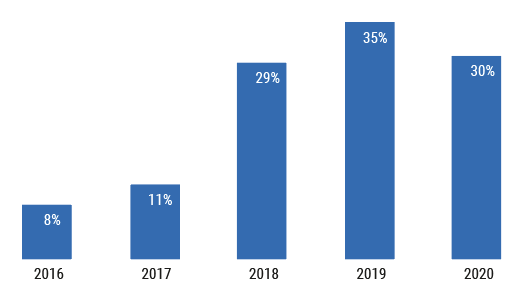
Historically, the main legal tool used for this purpose has been ‘Military Order 1651 Concerning Security Matters’ (hereafter: MO 1651).[8] Article 60 of this order allows “any soldier or authorized body so appointed” to seize any object, when there is a suspicion that it has been, or could be, used to commit a criminal offense.
In recent years, seizures are increasingly conducted, citing the ‘Military Regulations Concerning the Transfer of Goods’ (hereafter: the Regulations), which allow for the confiscation of structures lacking the required permits, after an ICA inspector has determined that they are ‘movable structures’.[9] The initial version of the Regulations authorized such confiscations only within 30 days of the installation of a structure; however, an amendment introduced in 2015 extended this period to 60 days, and the latest amendment from August 2020, to 90 days. The 2015 amendment also expanded the applicability of the Regulations to include ‘movable elements’, such as prefabricated walls and roofs, within an otherwise fixed structure.
Neither MO 1651 nor the Regulations require the authorities to provide prior notice about their intention to seize a property, thus preventing affected people from objecting in advance. Confiscated structures may be recovered, but this requires the owners to pay the ICA for transportation and storage expenses, as well as committing to not reinstalling the structure without a building permit. As these permits are almost impossible to obtain, such recoveries rarely happen.
Since 2016, international donors have requested the Israeli authorities to return to Palestinian beneficiaries over 210 humanitarian aid structures that they have funded for a value of over 300,000 euros and were subsequently seized. However, none of these structures have been so far recovered.[10]
These seizures procedures radically differ from the regular planning legislation applicable in Area C.[11] Here, the first enforcement measure against an unlicensed structure is a stop-work order, which gives the owner 30 days to submit an objection to the ICA and to try to obtain a building permit retroactively. If this fails, the ICA may issue a final demolition order, usually to be implemented within two to four weeks, during which the owner may petition an Israeli court and potentially obtain an injunction freezing the demolition.
Due to its ability to circumvent the normal processes, the Head of the Supervision Unit within the ICA, recently characterized the procedure under the Regulations as “a strategic tool”. He added: “today, when I see a movable structure, once I know that it has been there for less than 90 days, I don’t even give the person a paper. I organize a taskforce and go out to the field”.[12]
The case of the Ras at Tin school
“Our children were so excited about having their own school!”, explained Abu Salameh, the leader of the Ras At Tin Bedouin community, located in Area C, northeast of Ramallah. The school, built in 2020 with the financial support of the European Union, provides primary education to some 50 children who previously had to travel/walk five kilometers along an unsafe road to reach the nearest school in Al Mughayir village.
On 6 September 2020, the first day of class, Israeli forces arrived at the site and confiscated the roof of the school without prior notice. A new roof was confiscated again on 10 September, along with construction materials, chairs and tables. The ICA also issued a demolition order against the rest of the school, which as of the time of writing could not be executed due to a temporary injunction issued by the Israeli Supreme Court, following a petition filed by the community.
Ras at Tin, home to about 200 people, is located in an area designated as closed for Israeli military training; it is subject to a range of pressures that, combined, creates a coercive environment and the risk of forcible transfer for its residents.
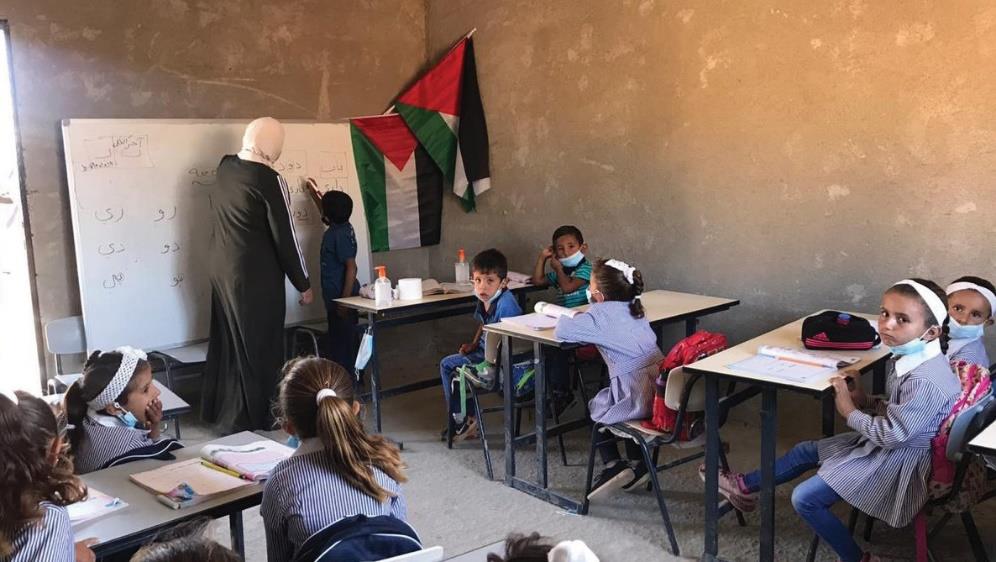
Expediting demolitions: targeting ‘new’ structures
On April 2018, the Israeli authorities issued Military Order 1797 (hereafter: MO 1797), which allows for the demolition of unlicensed structures in Area C deemed as ‘new’, within 96 hours of a removal notice being delivered.[13] According to the Order, ‘new structures’ are those which an ICA inspector determines were built in the previous six months, or inhabited for less than 30 days, prior to the issuance of a removal notice.
Like the confiscation tools discussed above, MO 1797 also serves to circumvent the procedures established under the regular planning legislation, thus severely restricting the ability of Palestinians to be heard before a judicial body. According to the Order, the only means by which someone can stop a demolition is to prove that the structure has a valid building permit, or that it is not ‘new’. While, in principle, affected people may challenge the demolition in an Israeli court, given the limited grounds for exceptions, as well as the narrow time frame, the likelihood of success is minimal.
The authorities began implementing MO 1797 in July 2019, after a principled petition against it, filed by humanitarian partners in the Israeli High Court of Justice, was rejected. Since then, at least 107 structures, including 17 provided as humanitarian assistance, have been destroyed, or otherwise removed, on this basis. In most cases, the period between the issuance of a notice and the actual demolition has been significantly longer than the 96 hours stipulated in the Order; however, this has declined from an average of 21 days in 2019 to 15 days in 2020.
East Jerusalem: reduced access to courts and increasing pressures
Saud Qunbar, a father of six, received a demolition order from the Jerusalem Municipality after constructing his house in the Jabal al Mukkabir neighborhood in 2015 without a building permit. “For the past five years I have been trying to legalize the building. I hired a lawyer, paid tens of thousands of shekels in fines and submitted a planning scheme […] In August 2020, municipality inspectors, accompanied by Israeli police and a bulldozer, came to my house three times to threaten me”, he recalls. “The first time they said that if I didn’t demolish the house myself, they would raze the whole area. The second time they warned me that I’d have to pay 90,000 shekels in demolition fees […] I was left with no choice but to demolish the house by myself […] I felt like a father losing a son. There’s nothing worse than this feeling! […] After that, they came again and demanded that I remove all the rubble. I still cannot understand what happened. I’m getting calls from the school asking why my kids aren’t attending. I am sleeping in my car beside the rubble of my house.”
Of the structures demolished or seized in 2020 on the grounds of a lack of building permits, over 175 were in occupied East Jerusalem. While this is approximately the same as the average recorded in the previous three years (2017-2019), the proportion of self-demolitions in 2020 reached 47 per cent, up from an average of 21 per cent previously.
Percentages of structures demolished by the owners (out of all targeted structures) in East Jerusalem
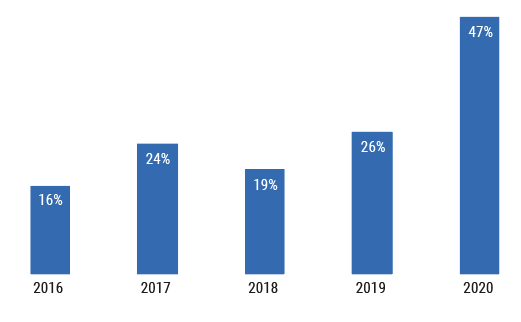
Anecdotal evidence suggests that this increase in self-demolitions is related to new Israeli legislation passed in recent years. This legislation has made it more difficult for Palestinian residents to protect their properties and avoid displacement via legal proceedings, while making it easier for the Jerusalem Municipality to pressure them to demolish their properties by themselves.[14]
On 2017, the Israeli Parliament (the Knesset) approved a comprehensive amendment to its Planning and Building Law, known as ‘Amendment 116’, which entered into force in October of the same year and applies to both Israel and East Jerusalem. This Amendment was subsequently followed by related Regulations, which came into force on December 2018.[15]
The Regulations changed the status of planning and building offenses from criminal to administrative offences, thus expanding the power of municipalities to impose related fines, which may reach up to NIS 300,000, depending on various criteria.[16] In addition, the owners of an illegal structure may be charged with extra fines for any additional day’s use of such a structure, as well as with the cost of the demolition itself, if this is carried out by the Municipality and not by the owner. Also, the validity of an administrative demolition order issued by the Municipality was extended from two to six months, following which, if it is not implemented, a judicial order has to be issued.
Prior to the Amendment, judges had the discretion to consider a wide range of factors and circumstances warranting a postponement of a demolition, resulting in legal proceedings often lasting for several years. This discretion has been significantly narrowed under the new amendment, with courts now allowed to postpone a demolition for very limited specified reasons and only for a maximum of one year, regardless of the circumstances. The discretion of courts regarding fines and expenses charged by the Municipality has also been significantly curtailed.[17]
On 11 November 2020, the Ministry of Justice announced that the implementation of the Amendment would be temporarily frozen regarding new cases; it is unclear whether this freeze applies to the Regulations too.[18]
[1] Seven residential structures located in Areas A and B, home to the families of perpetrators, or suspected perpetrators, of attacks resulting in the killing of Israelis, were targeted on punitive grounds.
[2] OCHA, Area C: Key Humanitarian Concerns, and East Jerusalem: Key Humanitarian Concerns.
[3] The information was provided as part of two separate information requests made by the Israeli NGO, Bimkom, Planners for Planning Rights, on the basis of the Freedom of Information Act.
[4] This prompted the Humanitarian Coordinator for the OPT, Jamie McGoldrick, on 10 September 2020 to call on the Israeli authorities to immediately stop demolitions.
[5] Geneva Convention IV, Relative to the Protection of Civilian Persons in Times of War, Article 53. According to Article 147 of this Convention, the extensive destruction of such property, as well as the forcible transfer of protected people, are considered grave breaches of the Convention, which may amount to war crimes.
[6] See for example, the International Covenant of Economic, Social and Cultural Rights, Article 11. Israeli is a signatory to this treaty, and, according to the International Court of Justice, it must implement it in all areas under its jurisdiction, including in the OPT.
[7] International Covenant on Civil and Political Rights, Article 14. Israeli is a signatory to this treaty, and, according to the International Court of Justice, it must implement it in all areas under its jurisdiction, including in the OPT.
[8] Unofficial English translation of MO 1651 available online.
[9] ‘Regulations Concerning the Transfer of Goods (Transport of Movable Structures) (Judea and Samaria), 1993’. Hebrew version available online. These regulations are based and further elaborate on ‘IDF Military Order 1252 Concerning the Transfer of Goods, 1988’.
[10] Information provided by the West Bank Protection Consortium.
[11] Planning and construction in Area C is governed by the Jordanian ‘Villages and Buildings Planning Law no. 79 of 1966’, as modified by the Israeli ‘Military Order Concerning Towns, Villages and Buildings Planning Law (Judea & Samaria) (No. 418), 1971’.
[12] Statements were made during a meeting of the Defense and Foreign Affairs Committee of the Israeli Parliament (Knesset) held on 13 August 2020 and entitled “The struggle over Area C”. A full recording of the meeting (in Hebrew) is available online.
[13] ‘IDF Military Order 1797 Concerning the Removal of New Buildings (Judea and Samaria), 2018.
[14] For a more detailed analysis see: Ir Amim, Amendment 116 to the Planning and Building Law and the Palestinian Neighborhoods in East Jerusalem, July 2019.
[15] Administrative Offenses Regulations (Administrative Fines – Planning and Building), 2018.
[16] Ibid.
[17] Planning and Building Law, Article 254 (9).
[18] Jonathan Lis, “Israel stops enforcing contentious law”, Haaretz, 12 November 2020.
